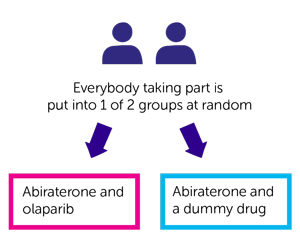A trial looking at olaparib and abiraterone for prostate cancer (PROpel)
Please note - this trial is no longer recruiting patients. We hope to add results when they are available.
Cancer type:
Status:
Phase:
- has spread to other parts of the body
- got worse despite having hormone treatment
More about this trial
- abiraterone and olaparib
- abiraterone and a dummy drug (placebo)
Who can enter
- you have a type of prostate cancer called adenocarcinoma
- your cancer has spread to other parts of the body (metastatic) and got worse despite having hormone treatment (castration resistant)
- you are going to have treatment for metastatic castration resistant prostate cancer for the first time
- you have had surgery to remove the testicles or you have been taking drugs to lower the amount of testosterone in your body
- doctors think that abiraterone is a suitable treatment for you
- you have satisfactory blood test results
- there is a tissue sample of your cancer available from a biopsy or surgery (or you are willing to have a new sample taken)
- you are well enough to carry out your normal activities apart from heavy physical work (performance status 0 or 1)
- you are willing to use reliable contraception during treatment and for 3 months afterwards if there is any possibility your partner could become pregnant
- you can swallow and absorb tablets
- you are aged 18 or over
- have cancer spread in your brain (brain metastases)
- have spinal cord compression unless you have had treatments and it has been stable for 4 weeks
- have moderate or severe side effects from previous cancer treatment apart from hair loss
- have had olaparib, abiraterone or any other similar drug
- have had chemotherapy or radiotherapy in the past 3 weeks (1 week if it was radiotherapy to help with symptoms)
- have a blood disorder called myelodysplastic syndrome (MDS) or acute myeloid leukaemia (AML)
- have had another cancer in the past 5 years apart from non melanoma skin cancer that has been successfully treated
- have side effects from major surgery that you had in the last 2 weeks
- have heart problems such as high blood pressure, angina that isn’t stable, an irregular heart rhythm, or you have had a heart attack in the past 6 months
- have had a stroke in the last 6 months
- are going to have heart surgery or you have had surgery to widen narrowed or blocked blood vessels
- have problems with your pituitary gland or adrenal glands
- have lung problems such as inflammation of the lung tissue (pneumonitis)
- take, or have taken drugs from a group of medicines called CYP3A inhibitors and CYP3A inducers in the last 3 weeks
- have an active infection
- have HIV
- have hepatitis B or hepatitis C
- have had a bone marrow transplant from a donor
- can’t take drugs that damp down your immune system (steroids) for any reason or you take a high dose of steroids every day (your doctor can tell you more about this)
- are taking part, or have taken part in another clinical trial looking at a new drug or device in the past month
- have any other medical condition or mental health problem that doctors think could affect you taking part
- are sensitive to olaparib, abiraterone or anything they contain
- are involved in the planning or running of this trial
Trial design
- abiraterone and olaparib
- abiraterone and a dummy drug
You take abiraterone tablets once, every day. You swallow the tablets whole with a glass of water. Take them at least one hour before food, or at least 2 hours after eating.
- certain proteins (biomarkers) that can tell how well treatment is working
- genes that can affect how we grow and develop
- every 4 weeks for a year
- then every 8 weeks for as long as you take part in this trial
Hospital visits
- physical examination
- heart trace (electrocardiogram)
- ultrasound scan of your heart (ECHO)
- blood tests
- a CT scan or MRI scan
- bone scan
Side effects
- a drop in the number of red blood cells (anaemia) causing shortness of breath and tiredness
- feeling or being sick
- tiredness (fatigue)
- indigestion (heartburn)
- loss of appetite
- headaches
- taste changes
- dizziness
- loose or watery poo (diarrhoea)
- cough
Recruitment start:
Recruitment end:
How to join a clinical trial
Please note: In order to join a trial you will need to discuss it with your doctor, unless otherwise specified.
Chief Investigator
Professor Noel Clarke
Supported by
AstraZeneca
If you have questions about the trial please contact our cancer information nurses
Freephone 0808 800 4040




